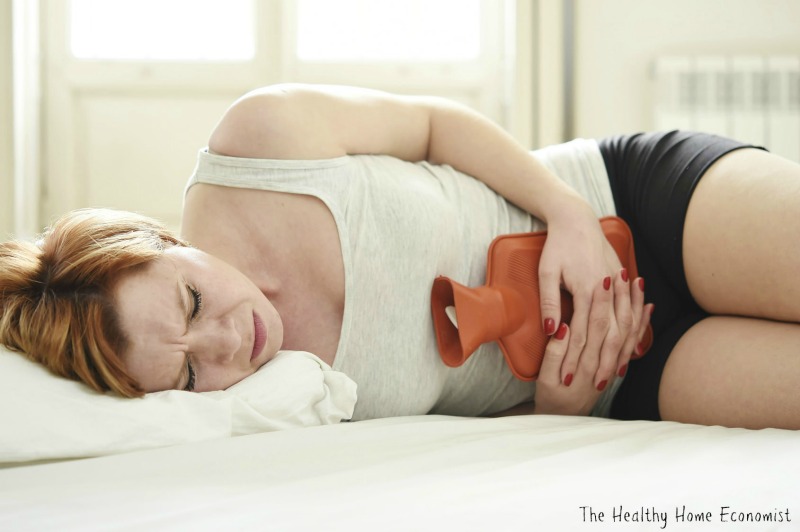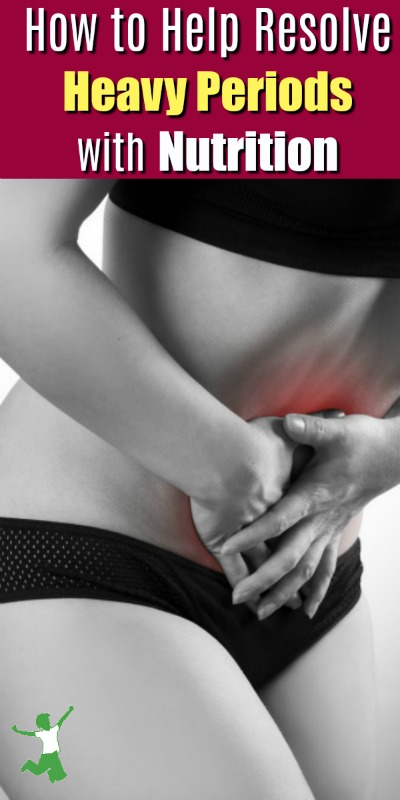Heavy periods are a health risk over the long term that most women do not realize can frequently be resolved with dietary intervention. Try this approach first before resorting to surgery or drugs to address the problem!

Heavy periods, or menorrhagia, is a common problem for women particularly as they approach menopause. It is also a problem for women with endometriosis.
This problem has also emerged as a common side effect of vaccination for coronavirus. Post-menopausal women are even experiencing breakthrough bleeding. (1)
Excess estrogen can frequently be a cause too. Estrogen dominance is a real threat in our modern environment loaded with estrogen-mimicking chemicals like BPA and pesticides seemingly everywhere.
In addition, estrogenic foods like soy are an ingredient in a majority of processed foods.
Be aware that soy protein and soya milk can trigger similar effects as edamame or other whole forms of soy.
Heavy periods put a woman at risk for anemia, infertility, weakness, and persistent fatigue if not corrected.
Unfortunately, conventional treatments for this condition involve only drugs and surgery. Options include the birth control pill, hormone-releasing IUDs, hysterectomy, or a more recent technique called endometrial ablation.
I know several women who have undergone endometrial ablation in recent months to combat heavy periods.
This surgical technique involves the destruction of the uterine lining either with a laser, radiofrequency or microwaves, or heated water.
The ladies I know who have had this procedure swear by it and were very happy with the results. However, this approach is not an option for younger women who want to have children.
It is also best to avoid a surgical procedure unless absolutely necessary. Complications are always possible such as infection of the bladder or damage to the womb or large intestine.
Nutritional Intervention for Menorrhagia
The good news is that heavy and/or irregular periods frequently respond well to simple nutritional support.
This approach also helps significantly with cramping. Heavy cycles are frequently painful ones as well.
Natural Vitamin A
Vitamin A is known to help with excess estrogen so a simple increase in the amount of natural Vitamin A in the diet can help reduce heavy cyclical bleeding.
The Vitamin A must be natural and not synthetic. Excess intake of synthetic Vitamin A can produce deleterious effects.
In fact, some researchers believe that synthetic vitamin A interferes with the proper utilization of natural vitamin A from food. Thus, avoidance of the many synthetically fortified foods on the market is important as well. (2)
Plant-based Sources Ineffective
It is important to note that beta carotene will not help here! The source must be true vitamin A best found in ideal doses in high vitamin cod liver oil.
According to a case study written about in the book Eat Fat, Lose Fat, 2 tablespoons of high vitamin cod liver oil per day supplying about 60,000 IU of Vitamin A for 3 days in a row eliminated this debilitating problem for one woman who had been suffering from what she called a “never-ending period” for 4 years. (3)
Ongoing Supplementation
Note that a daily maintenance dose of high vitamin unheated cod liver oil (1 tsp per day) after that was sufficient to keep the problem of heavy periods from returning.
This brand is what my family takes.
Cod Liver Oil for Heavy Periods Before Drugs or Surgery
Do you suffer from heavy periods and have reached the end of your rope? If you are considering surgery, why not try this simple remedy to see if it might work for you?
Be sure to use ONLY high vitamin cod liver oil that contains natural Vitamin A. I recommend Dropi cod liver oil.
Most of the brands on the market today use synthetic Vitamin A instead of the real thing.
Worse, it is not clearly labeled.
Using cod liver oil with synthetic A or supplements containing beta carotene will not be helpful for resolving heavy periods.
For vetted and tested sources of high vitamin cod liver oil that use only natural Vitamin A and no synthetics, check my Resources page.

References
(1) Post-vaccine menorrhagia, metrorrhagia or postmenopausal bleeding
(2) Vitamin A Saga
(2) Eat Fat, Lose Fat








I haven’t taken FCLO very long, but I have been eating a paleo diet since springtime. It took 4-5 months before I was no longer flooding and required ibuprofen for at least a day. I think eliminating the contributing foods makes a huge impact. I am gluten free, mostly using grass fed meat and butter sources and feel so much better.
Could you clue me in on how they derive the CLO? I mean do they just squish the whole fish or cook it down? I just was wondering & i wanted to google it. ~thanks
Good grief. MERRY CHRISTMAS!
Thank u, thank u, THANK U! For posting this! Earlier this yr. I was told to have a hysterectomy (by a cold and the worst bedside manner I’ve ever seen!); I cried for days…I went to see another Gyno & he told me that the surgery was not needed. Now, I’m empowered & will b taking this cod liver. Love ur articles, Sarah. =)
Thanks to those who responded about the fibroids, I will give your ideas a try! BTW, my name is Susan 🙂
I really needed this, thank you Sarah. I suffer from this, even AFTER having an ablation done. It did help for several months but then the long periods started again. That was 2 years ago. I have been taking FCLO/BO for general health, but only the 1/2 tsp dose for about six weeks now. Starting today, I will bump that up.
Wish I had known about this before I had my surgery. At the time I thought I had exhausted all options and surgery was the only route left. I know so much more now.
This totally works..after reading this on your blog this summer I bought a bottle of green pastures and it completely worked..the difference was amazing..thanks, Sarah!!!
Has anyone tried fibrovan?